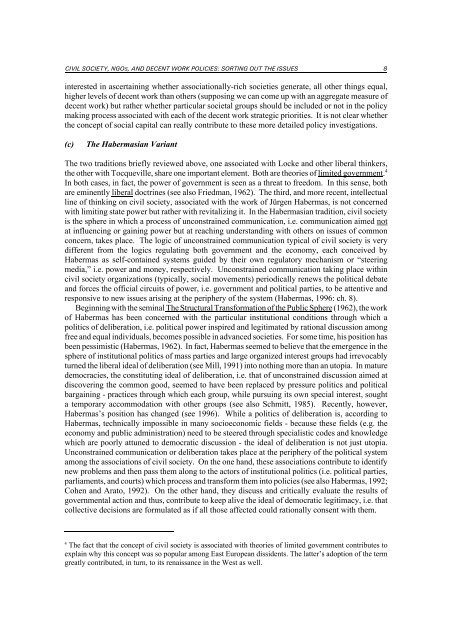Civil Society, NGOs, and Decent Work Policies: Sorting out the Issues
Civil Society, NGOs, and Decent Work Policies: Sorting out the Issues
Civil Society, NGOs, and Decent Work Policies: Sorting out the Issues
You also want an ePaper? Increase the reach of your titles
YUMPU automatically turns print PDFs into web optimized ePapers that Google loves.
CIVIL SOCIETY, NGOS, AND DECENT WORK POLICIES: SORTING OUT THE ISSUES 8<br />
interested in ascertaining whe<strong>the</strong>r associationally-rich societies generate, all o<strong>the</strong>r things equal,<br />
higher levels of decent work than o<strong>the</strong>rs (supposing we can come up with an aggregate measure of<br />
decent work) but ra<strong>the</strong>r whe<strong>the</strong>r particular societal groups should be included or not in <strong>the</strong> policy<br />
making process associated with each of <strong>the</strong> decent work strategic priorities. It is not clear whe<strong>the</strong>r<br />
<strong>the</strong> concept of social capital can really contribute to <strong>the</strong>se more detailed policy investigations.<br />
(c)<br />
The Habermasian Variant<br />
The two traditions briefly reviewed above, one associated with Locke <strong>and</strong> o<strong>the</strong>r liberal thinkers,<br />
<strong>the</strong> o<strong>the</strong>r with Tocqueville, share one important element. Both are <strong>the</strong>ories of limited government. 4<br />
In both cases, in fact, <strong>the</strong> power of government is seen as a threat to freedom. In this sense, both<br />
are eminently liberal doctrines (see also Friedman, 1962). The third, <strong>and</strong> more recent, intellectual<br />
line of thinking on civil society, associated with <strong>the</strong> work of Jürgen Habermas, is not concerned<br />
with limiting state power but ra<strong>the</strong>r with revitalizing it. In <strong>the</strong> Habermasian tradition, civil society<br />
is <strong>the</strong> sphere in which a process of unconstrained communication, i.e. communication aimed not<br />
at influencing or gaining power but at reaching underst<strong>and</strong>ing with o<strong>the</strong>rs on issues of common<br />
concern, takes place. The logic of unconstrained communication typical of civil society is very<br />
different from <strong>the</strong> logics regulating both government <strong>and</strong> <strong>the</strong> economy, each conceived by<br />
Habermas as self-contained systems guided by <strong>the</strong>ir own regulatory mechanism or “steering<br />
media,” i.e. power <strong>and</strong> money, respectively. Unconstrained communication taking place within<br />
civil society organizations (typically, social movements) periodically renews <strong>the</strong> political debate<br />
<strong>and</strong> forces <strong>the</strong> official circuits of power, i.e. government <strong>and</strong> political parties, to be attentive <strong>and</strong><br />
responsive to new issues arising at <strong>the</strong> periphery of <strong>the</strong> system (Habermas, 1996: ch. 8).<br />
Beginning with <strong>the</strong> seminal The Structural Transformation of <strong>the</strong> Public Sphere (1962), <strong>the</strong> work<br />
of Habermas has been concerned with <strong>the</strong> particular institutional conditions through which a<br />
politics of deliberation, i.e. political power inspired <strong>and</strong> legitimated by rational discussion among<br />
free <strong>and</strong> equal individuals, becomes possible in advanced societies. For some time, his position has<br />
been pessimistic (Habermas, 1962). In fact, Habermas seemed to believe that <strong>the</strong> emergence in <strong>the</strong><br />
sphere of institutional politics of mass parties <strong>and</strong> large organized interest groups had irrevocably<br />
turned <strong>the</strong> liberal ideal of deliberation (see Mill, 1991) into nothing more than an utopia. In mature<br />
democracies, <strong>the</strong> constituting ideal of deliberation, i.e. that of unconstrained discussion aimed at<br />
discovering <strong>the</strong> common good, seemed to have been replaced by pressure politics <strong>and</strong> political<br />
bargaining - practices through which each group, while pursuing its own special interest, sought<br />
a temporary accommodation with o<strong>the</strong>r groups (see also Schmitt, 1985). Recently, however,<br />
Habermas’s position has changed (see 1996). While a politics of deliberation is, according to<br />
Habermas, technically impossible in many socioeconomic fields - because <strong>the</strong>se fields (e.g. <strong>the</strong><br />
economy <strong>and</strong> public administration) need to be steered through specialistic codes <strong>and</strong> knowledge<br />
which are poorly attuned to democratic discussion - <strong>the</strong> ideal of deliberation is not just utopia.<br />
Unconstrained communication or deliberation takes place at <strong>the</strong> periphery of <strong>the</strong> political system<br />
among <strong>the</strong> associations of civil society. On <strong>the</strong> one h<strong>and</strong>, <strong>the</strong>se associations contribute to identify<br />
new problems <strong>and</strong> <strong>the</strong>n pass <strong>the</strong>m along to <strong>the</strong> actors of institutional politics (i.e. political parties,<br />
parliaments, <strong>and</strong> courts) which process <strong>and</strong> transform <strong>the</strong>m into policies (see also Habermas, 1992;<br />
Cohen <strong>and</strong> Arato, 1992). On <strong>the</strong> o<strong>the</strong>r h<strong>and</strong>, <strong>the</strong>y discuss <strong>and</strong> critically evaluate <strong>the</strong> results of<br />
governmental action <strong>and</strong> thus, contribute to keep alive <strong>the</strong> ideal of democratic legitimacy, i.e. that<br />
collective decisions are formulated as if all those affected could rationally consent with <strong>the</strong>m.<br />
4<br />
The fact that <strong>the</strong> concept of civil society is associated with <strong>the</strong>ories of limited government contributes to<br />
explain why this concept was so popular among East European dissidents. The latter’s adoption of <strong>the</strong> term<br />
greatly contributed, in turn, to its renaissance in <strong>the</strong> West as well.
















